| Listing 1 - 10 of 225 | << page >> |
Sort by
|
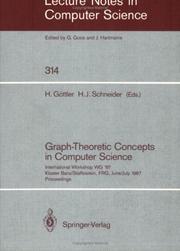
ISBN: 3540194223 3540392645 Year: 1988 Publisher: Berlin Heidelberg New York Springer
Abstract | Keywords | Export | Availability | Bookmark
 Loading...
Loading...Choose an application
- Reference Manager
- EndNote
- RefWorks (Direct export to RefWorks)
This book reflects the scientific program of the annual workshop on Graph-theoretic Concepts in Computer Science in 1987. The purpose of this conference is to be the "missing link" between theory and application of graphs in as many branches of computer science as a conference scheduled for three days without parallel sessions can permit. So the organizers of WG '87 addressed a selected group of people with a strong interest in theory and practice. The proceedings include latest results on "classical" graph-theoretic problems (including formal language theory applied to graphs) and how to apply those results to practical problems, e.g. data bases, layout of graph operating systems, software engineering, chemistry, and modelling with graphs.
Computer science --- Discrete mathematics --- 681.3*F0 --- Computerwetenschap--?*F0 --- Information theory. --- Mathematics. --- Computer software. --- Theory of Computation. --- Mathematics, general. --- Algorithm Analysis and Problem Complexity. --- Software, Computer --- Computer systems --- Math --- Science --- Communication theory --- Communication --- Cybernetics --- Graphes, Théorie des --- Informatique
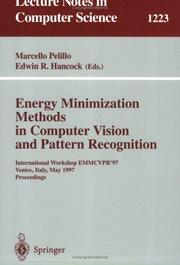
ISBN: 3540629092 3540690425 9783540629092 Year: 1997 Volume: 1223 Publisher: Berlin, Heidelberg : Springer Berlin Heidelberg : Imprint: Springer,
Abstract | Keywords | Export | Availability | Bookmark
 Loading...
Loading...Choose an application
- Reference Manager
- EndNote
- RefWorks (Direct export to RefWorks)
This book constitutes the refereed proceedings of the International Workshop on Energy Minimization Methods in Computer Vision and Pattern Recognition, EMMCVPR'97, held in Venice, Italy, in May 1997. The book presents 29 revised full papers selected from a total of 62 submissions. Also included are four full invited papers and a keynote paper by leading researchers. The volume is organized in sections on contours and deformable models, Markov random fields, deterministic methods, object recognition, evolutionary search, structural models, and applications. The volume is the first comprehensive documentation of the application of energy minimization techniques in the areas of compiler vision and pattern recognition.
Computer vision --- Pattern recognition systems --- Neural networks (Computer science) --- Evolutionary computation --- Simulated annealing (Mathematics) --- Congresses. --- Applied Physics --- Engineering & Applied Sciences --- Congresses --- Algorithm, Annealing --- Algorithm, Probabilistic exchange --- Annealing, Monte Carlo --- Annealing, Simulated --- Annealing algorithm --- Cooling, Statistical --- Exchange algorithm, Probabilistic --- Hill climbing, Probabilistic --- Monte Carlo annealing --- Probabilistic exchange algorithm --- Probabilistic hill climbing --- Relaxation, Stochastic --- Statistical cooling --- Stochastic relaxation --- Computer science. --- Computers. --- Algorithms. --- Artificial intelligence. --- Computer graphics. --- Image processing. --- Pattern recognition. --- Computer Science. --- Artificial Intelligence (incl. Robotics). --- Pattern Recognition. --- Image Processing and Computer Vision. --- Computer Graphics. --- Algorithm Analysis and Problem Complexity. --- Computation by Abstract Devices. --- Optical pattern recognition. --- Computer vision. --- Computer software. --- Artificial Intelligence. --- Software, Computer --- Computer systems --- Machine vision --- Vision, Computer --- Artificial intelligence --- Image processing --- Optical data processing --- Pattern perception --- Perceptrons --- Visual discrimination --- Automatic drafting --- Graphic data processing --- Graphics, Computer --- Computer art --- Graphic arts --- Electronic data processing --- Engineering graphics --- Informatics --- Science --- AI (Artificial intelligence) --- Artificial thinking --- Electronic brains --- Intellectronics --- Intelligence, Artificial --- Intelligent machines --- Machine intelligence --- Thinking, Artificial --- Bionics --- Cognitive science --- Digital computer simulation --- Logic machines --- Machine theory --- Self-organizing systems --- Simulation methods --- Fifth generation computers --- Neural computers --- Digital techniques --- Optical data processing. --- Automatic computers --- Automatic data processors --- Computer hardware --- Computing machines (Computers) --- Electronic calculating-machines --- Electronic computers --- Hardware, Computer --- Cybernetics --- Calculators --- Cyberspace --- Algorism --- Algebra --- Arithmetic --- Optical computing --- Visual data processing --- Integrated optics --- Photonics --- Computers --- Design perception --- Pattern recognition --- Form perception --- Perception --- Figure-ground perception --- Foundations --- Optical equipment --- Computer vision - Congresses. --- Pattern recognition systems - Congresses. --- Neural networks (Computer science) - Congresses. --- Evolutionary computation - Congresses. --- Simulated annealing (Mathematics) - Congresses. --- Pattern perception.
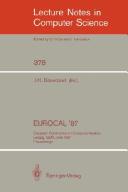
ISBN: 3540515178 9780387515175 0387515178 3540482075 Year: 1989 Publisher: Berlin New York Springer
Abstract | Keywords | Export | Availability | Bookmark
 Loading...
Loading...Choose an application
- Reference Manager
- EndNote
- RefWorks (Direct export to RefWorks)
This is the sixth in a series of conference proceedings of international conferences on computer algebra held in Europe. All the preceding ones have also been published as Lecture Notes in Computer Science. They contain original research material not published elsewhere, and a few invited lectures summarising the state of the art. Computer algebra is the science of using computers to do algebraic calculations, rather than the purely arithmetic calculations which we all know computers can do. These calculations may be polynomial-like calculations - one thread of the conference was devoted to polynomial algorithms - or may relate to other areas of mathematics such as integration, the solution of differential equations, or geometry - a second thread was devoted to those topics. The calculations can be applied in a wide range of scientific and engineering subjects, and in branches of mathematics. Physics has benefitted especially from these calculations, and the proceedings contain many papers on this, and also papers on applications in computer aided design and robotics, to name but a few other applications. The third thread of the proceedings was devoted to these applications and to the computer algebra systems which perform these calculations.
Artificial intelligence. Robotics. Simulation. Graphics --- Algebra --- Algèbre --- Data processing --- Congresses. --- Informatique --- Congrès --- 681.3*G4 --- 681.3*I1 --- 681.3*I10 --- 681.3*J2 --- Mathematical software: algorithm analysis; certification and testing; efficiency; portability; reliability and robustness; verification --- Algebraic manipulation (Computing methodologies) --- Computerwetenschap--?*I10 --- Physical sciences and engineering (Computer applications) --- 681.3*J2 Physical sciences and engineering (Computer applications) --- 681.3*I1 Algebraic manipulation (Computing methodologies) --- 681.3*G4 Mathematical software: algorithm analysis; certification and testing; efficiency; portability; reliability and robustness; verification --- Algèbre --- Congrès --- Mathematics --- Mathematical analysis --- Data processing&delete& --- Congresses --- Information theory. --- Computer science. --- Computer software. --- Engineering. --- Theory of Computation. --- Mathematical Logic and Formal Languages. --- Algorithm Analysis and Problem Complexity. --- Symbolic and Algebraic Manipulation. --- Complexity. --- Programming Languages, Compilers, Interpreters. --- Data processing. --- Software, Computer --- Computer systems --- Informatics --- Science --- Communication theory --- Communication --- Cybernetics --- Construction --- Industrial arts --- Technology
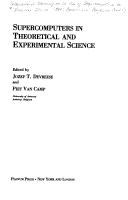
ISBN: 0306421070 1468450239 1468450212 Year: 1985 Publisher: New York ; London Plenum Press
Abstract | Keywords | Export | Availability | Bookmark
 Loading...
Loading...Choose an application
- Reference Manager
- EndNote
- RefWorks (Direct export to RefWorks)
Computer. Automation --- Pure sciences. Natural sciences (general) --- Supercomputers --- -681.3*C51 --- 681.3*G1 --- 681.3*G4 --- Electronic digital computers --- High performance computing --- Congresses --- Large and medium (mainframe) computers: super (very large) computers (Computer system implementation) --- Numerical analysis --- Mathematical software: algorithm analysis; certification and testing; efficiency; portability; reliability and robustness; verification --- 681.3*G4 Mathematical software: algorithm analysis; certification and testing; efficiency; portability; reliability and robustness; verification --- 681.3*G1 Numerical analysis --- 681.3*C51 Large and medium (mainframe) computers: super (very large) computers (Computer system implementation) --- 681.3*C51
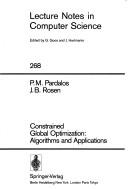
ISBN: 3540180958 0387180958 3540477551 9783540180951 9780387180953 Year: 1987 Volume: 268 Publisher: Berlin: Springer,
Abstract | Keywords | Export | Availability | Bookmark
 Loading...
Loading...Choose an application
- Reference Manager
- EndNote
- RefWorks (Direct export to RefWorks)
Global optimization is concerned with the characterization and computation of global minima or maxima of nonlinear functions. Such problems are widespread in mathematical modeling of real world systems for a very broad range of applications. The applications include economies of scale, fixed charges, allocation and location problems, quadratic assignment and a number of other combinatorial optimization problems. More recently it has been shown that certain aspects of VLSI chip design and database problems can be formulated as constrained global optimization problems with a quadratic objective function. Although standard nonlinear programming algorithms will usually obtain a local minimum to the problem , such a local minimum will only be global when certain conditions are satisfied (such as f and K being convex).
Numerical methods of optimisation --- 519.6 --- 519.85 --- 681.3*G16 --- 681.3*G4 --- Computational mathematics. Numerical analysis. Computer programming --- Mathematical programming --- Optimization: constrained optimization; gradient methods; integer programming; least squares methods; linear programming; nonlinear programming (Numericalanalysis) --- Mathematical software: algorithm analysis; certification and testing; efficiency; portability; reliability and robustness; verification --- 681.3*G4 Mathematical software: algorithm analysis; certification and testing; efficiency; portability; reliability and robustness; verification --- 681.3*G16 Optimization: constrained optimization; gradient methods; integer programming; least squares methods; linear programming; nonlinear programming (Numericalanalysis) --- 519.85 Mathematical programming --- 519.6 Computational mathematics. Numerical analysis. Computer programming --- Numerical analysis. --- Numerical Analysis. --- Mathematical analysis --- Programming (Mathematics) --- Programmation (mathématiques) --- Programmation (mathématiques) --- Programmation non lineaire
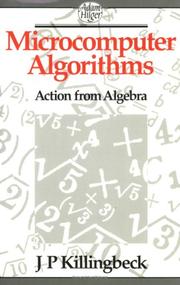
ISBN: 0750300973 Year: 1991 Publisher: Bristol : Hilger,
Abstract | Keywords | Export | Availability | Bookmark
 Loading...
Loading...Choose an application
- Reference Manager
- EndNote
- RefWorks (Direct export to RefWorks)
Algebra --- -Microcomputers --- -#KVIV:BB --- 519.6 --- 681.3 *G10 --- 681.3*G4 --- Home computers --- Micro computers --- Micros (Microcomputers) --- PCs (Microcomputers) --- Personal computers --- Small computers --- Minicomputers --- Mathematics --- Mathematical analysis --- Data processing --- Programming --- Computational mathematics. Numerical analysis. Computer programming --- Computerwetenschap--?*G10 --- Mathematical software: algorithm analysis; certification and testing; efficiency; portability; reliability and robustness; verification --- Microcomputers --- Data processing. --- Programming. --- 681.3*G4 Mathematical software: algorithm analysis; certification and testing; efficiency; portability; reliability and robustness; verification --- 519.6 Computational mathematics. Numerical analysis. Computer programming --- #KVIV:BB --- Algebra - Data processing. --- Microcomputers - Programming. --- Algebre lineaire --- Methodes numeriques

ISBN: 0412345706 9780412345708 Year: 1990 Publisher: London : Chapman and Hall,
Abstract | Keywords | Export | Availability | Bookmark
 Loading...
Loading...Choose an application
- Reference Manager
- EndNote
- RefWorks (Direct export to RefWorks)
Programming --- Pure sciences. Natural sciences (general) --- -681.3*G4 --- Mathematical software: algorithm analysis; certification and testing; efficiency; portability; reliability and robustness; verification --- 681.3*G4 Mathematical software: algorithm analysis; certification and testing; efficiency; portability; reliability and robustness; verification --- Computer software --- Mathematics --- Congresses. --- Data processing --- 519.688 --- 681.3*G4 --- 519.688 Programs and algorithms for computer solution of specific problems --- Programs and algorithms for computer solution of specific problems --- Math --- Science --- Congresses --- Data processing&delete& --- Mathematics - Data processing - Congresses. --- Computer software - Congresses. --- Computer software - Congresses
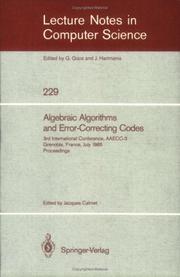
ISBN: 3540167765 3540398554 Year: 1986 Volume: vol 229 Publisher: Berlin Heidelberg New York Springer
Abstract | Keywords | Export | Availability | Bookmark
 Loading...
Loading...Choose an application
- Reference Manager
- EndNote
- RefWorks (Direct export to RefWorks)
Artificial intelligence. Robotics. Simulation. Graphics --- Information systems --- 519.7 --- 681.3 *G10 --- Mathematical cybernetics --- Computerwetenschap--?*G10 --- 519.7 Mathematical cybernetics --- Computer engineering. --- Telecommunication. --- Computer software. --- Electrical Engineering. --- Communications Engineering, Networks. --- Algorithm Analysis and Problem Complexity. --- Software, Computer --- Computer systems --- Electric communication --- Mass communication --- Telecom --- Telecommunication industry --- Telecommunications --- Communication --- Information theory --- Telecommuting --- Computers --- Design and construction
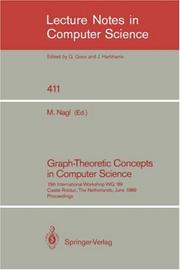
ISBN: 0387522921 3540522921 3540469508 Year: 1990 Volume: vol 411 Publisher: Berlin Heidelberg New York Tokyo Springer
Abstract | Keywords | Export | Availability | Bookmark
 Loading...
Loading...Choose an application
- Reference Manager
- EndNote
- RefWorks (Direct export to RefWorks)
The aim of this workshop series is to contribute to integration in computer science by applying graph-theoretic concepts. Commonalities between various fields of specialization in computer science may be detected by applying graph-theoretic concepts. The workshops are unusual in that they combine theoretical aspects with practice and applications. Applications dealt with in this volume include the use of graph-theoretic concepts in distributed and parallel computation, VLSI, CAD, software engineering, computer graphics, data structures, and computational geometry.
681.3*F0 --- Computerwetenschap--?*F0 --- Data structures (Computer scienc. --- Computer science. --- Software engineering. --- Combinatorics. --- Computer software. --- Data Structures and Information Theory. --- Programming Languages, Compilers, Interpreters. --- Software Engineering/Programming and Operating Systems. --- Algorithm Analysis and Problem Complexity. --- Computation by Abstract Devices. --- Software, Computer --- Computer systems --- Combinatorics --- Algebra --- Mathematical analysis --- Computer software engineering --- Engineering --- Informatics --- Science
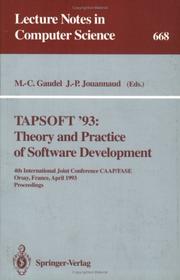
ISBN: 3540566104 0387566104 3540475982 Year: 1993 Volume: 668 Publisher: Berlin New York Barcelona Springer-Verlag
Abstract | Keywords | Export | Availability | Bookmark
 Loading...
Loading...Choose an application
- Reference Manager
- EndNote
- RefWorks (Direct export to RefWorks)
This volume contains the proceedings of the fourth International Joint Conference on the Theory and Practice of Software Development, TAPSOFT '93. Since the first in 1985, the aim of these conferences has been to bring together theoretical computer scientists and researchers in software engineering with a view to discussing how formal methods can usefully be applied in software development. TAPSOFT '93 consists ofthree parts: an advanced seminar, the Colloquium on Trees in Algebra and Programming (CAAP), and the Colloquium on Formal Approaches of Software Engineering (FASE). The advanced seminar includes four invited surveys and four invited conferences. The selected papers for CAAP are organized in seven sessions: specifications and proofs, concurrency, automata and counting, constraints solving, rewriting, logic and trees, analysis of algorithms, and a common session with FASE on type inference. The selected papers for FASE are presented in eight sessions: case studies in formal design and development, compositionality modules and development, formal development, foundations and analysis of formal specifications, verification of concurrent systems, model checking, parallel calculus, and a common session with CAAP on type inference.
Computer software --- Logiciels --- Development --- Congresses --- Développement --- Congrès --- Développement --- Congrès --- Computer software - Development - Congresses. --- Software engineering. --- Computer science. --- Computer software. --- Software Engineering/Programming and Operating Systems. --- Programming Techniques. --- Software Engineering. --- Programming Languages, Compilers, Interpreters. --- Computation by Abstract Devices. --- Algorithm Analysis and Problem Complexity. --- Software, Computer --- Computer systems --- Informatics --- Science --- Computer software engineering --- Engineering --- Congresses.
| Listing 1 - 10 of 225 | << page >> |
Sort by
|

 Search
Search Feedback
Feedback About UniCat
About UniCat  Help
Help News
News